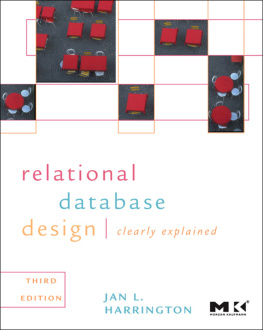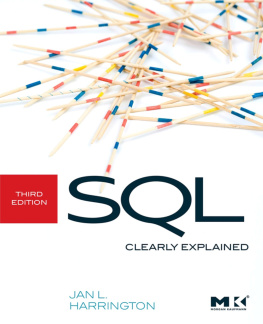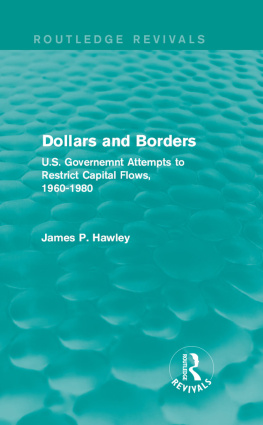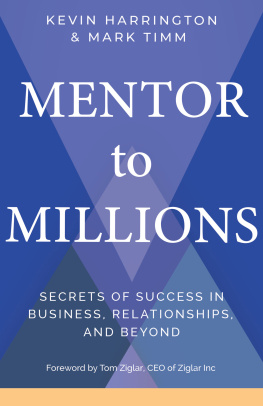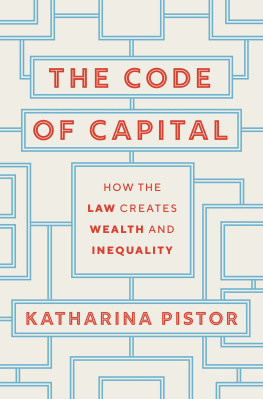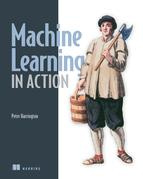Harrington - Capital without borders : wealth managers and the one percent
Here you can read online Harrington - Capital without borders : wealth managers and the one percent full text of the book (entire story) in english for free. Download pdf and epub, get meaning, cover and reviews about this ebook. City: Cambridge, Mass., year: 2016, publisher: Harvard University Press, genre: Home and family. Description of the work, (preface) as well as reviews are available. Best literature library LitArk.com created for fans of good reading and offers a wide selection of genres:
Romance novel
Science fiction
Adventure
Detective
Science
History
Home and family
Prose
Art
Politics
Computer
Non-fiction
Religion
Business
Children
Humor
Choose a favorite category and find really read worthwhile books. Enjoy immersion in the world of imagination, feel the emotions of the characters or learn something new for yourself, make an fascinating discovery.

- Book:Capital without borders : wealth managers and the one percent
- Author:
- Publisher:Harvard University Press
- Genre:
- Year:2016
- City:Cambridge, Mass.
- Rating:4 / 5
- Favourites:Add to favourites
- Your mark:
- 80
- 1
- 2
- 3
- 4
- 5
Capital without borders : wealth managers and the one percent: summary, description and annotation
We offer to read an annotation, description, summary or preface (depends on what the author of the book "Capital without borders : wealth managers and the one percent" wrote himself). If you haven't found the necessary information about the book — write in the comments, we will try to find it.
Capital without borders : wealth managers and the one percent — read online for free the complete book (whole text) full work
Below is the text of the book, divided by pages. System saving the place of the last page read, allows you to conveniently read the book "Capital without borders : wealth managers and the one percent" online for free, without having to search again every time where you left off. Put a bookmark, and you can go to the page where you finished reading at any time.
Font size:
Interval:
Bookmark:
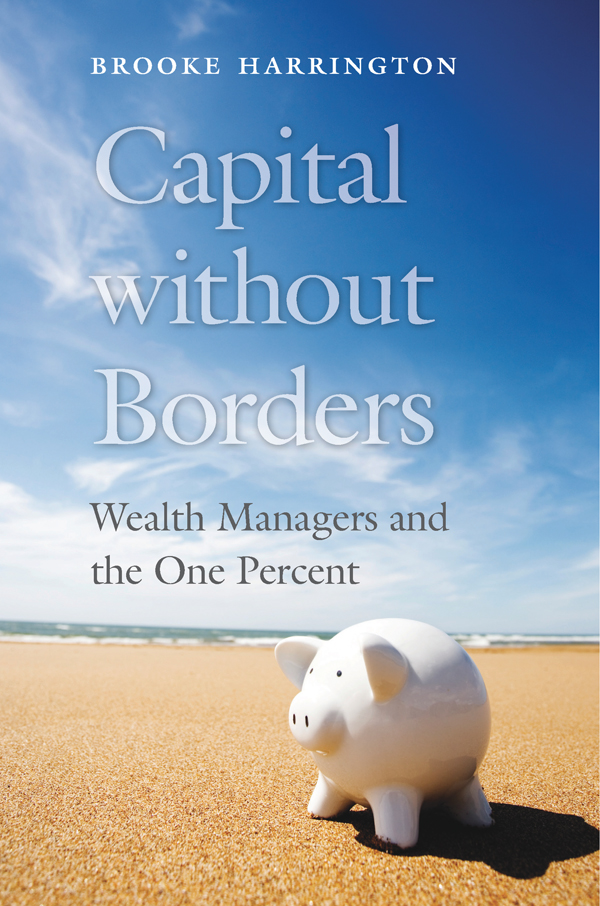
Capital without Borders
Wealth Managers and the One Percent

BROOKE HARRINGTON


Cambridge, Massachusetts, & London, England / 2016
Copyright 2016 by the President and Fellows of Harvard College
All rights reserved
Jacket photograph: urbancow Getty Images
Jacket design: Annamarie McMahon Why
978-0-674-74380-9 (alk. paper)
978-0-674-97364-0 (EPUB)
978-0-674-97362-6 (MOBI)
The Library of Congress has cataloged the printed edition as follows:
Names: Harrington, Brooke, 1968 author.
Title: Capital without borders : wealth managers and the one percent / Brooke Harrington.
Description: Cambridge, Massachusetts : Harvard University Press, 2016. | Includes bibliographical references and index.
Identifiers: LCCN 2016010534
Subjects: LCSH: Financial planners. | GlobalizationEconomic aspects. | Wealth. | WealthMoral and ethical aspects. | Income distribution. | International finance.
Classification: LCC HG179.5 .H576 2016 | DDC 332.6dc23 LC record available at http://lccn.loc.gov/2016010534
To ACH with love
He is surrounded by a mysterious halo of family confidences, of which he is known to be the silent depository. With these words, Charles Dickens introduces one of his most memorable characters: Mr. Tulkinghorn, the villain of Bleak House. Tulkinghorn is a lawyer specializing in trusts and estates, making him privy to the private lives of Britains nobility. A master of legal intricacies, Tulkinghorns emotionless, unreadable faade gives him a reputation much prized by his clients for protecting their secrets, as well as their fortunes.
Though he is their employee, Tulkinghorn wields a power that quietly controls the lives of his clients. This distinguishes him from the legion of other professionals and servants in the novel: unlike the family physicians, butlers, and governesses who serve the nobles, Tulkinghorns knowledge of the families innermost workings makes him their master. Such inside outsiders deserve more scrutiny than they have received, given their role in managing large capital flows at the boundary of private family life and the public worlds of law and the market. This is a gap in knowledge that I aspire to fill here.
In a sense, Bleak House can be read as a story of the triumph of professionals over nobles, and of knowledge over wealth. Dickens description of Tulkinghorn as the master of the mysteries of great houses is reminiscent of what Max Weber once wrote of the court accountants of the Persian shah: they made a secret doctrine of their budgetary art and even use a secret script to consolidate their power and ensure the shahs dependence upon them through obfuscation. This is one way of characterizing elite professional work, particularly in the domain now known as wealth managementthe business of deploying legal and financial expertise to defend the fortunes of high-net-worth individuals and families. These are the contemporary successors to Mr. Tulkinghorn.
Wealth managers will be the focus of this book because their work constitutes what the French anthropologist Marcel Mauss called un fait total socialthat is, a total social act, bringing together all the major institutions of a society.
Wealth management is a professional milieu coming together and in the process of being organized.
Because wealth management has only recently been professionalized, some basic issues are still being worked out, such as how to define the boundaries of the field and what name to adopt for practitioners. While the few studies of the profession acknowledge that there is no generally accepted standard definition of wealth management, there is widespread agreement among scholars and practitioners that a basic definition would be financial services provided to wealthy clients, mainly individuals and their families. Yet that label seems increasingly inadequate to the complexity of the professions activities. Now that STEP represents more than twenty thousand members in ninety-five countries, contemporary practice often involves not only trusteeship but also oversight of family businesses, coordination of many different types of assets around the world, and the ever-important consideration of the tax consequences of ownership and trading.
Attempts to capture the full complexity of professional activity have included the fanciful (fiscal alchemists), the utilitarian (transaction planners), and the politically pointed (income defense providers). Thus wealth managers is the term I will use in this book.
That the professionalization of trust and estate planning remains incomplete owes something to the changing nature of wealth itself. Historically, land ownership has been the primary source of great fortunes globally; this remains true in many parts of the world, particularly in Africa and Latin America. Until well into the nineteenth century, class solidarity sufficed to hold the system together without the intervention of professionals.
The professionalization of trust and estate planning ostensibly began with the Harvard College v. Amory decision of 1830, in which the Supreme Court of Massachusetts first acknowledged trustees as a professional class. This coincided with the development of a new kind of wealth, characteristic of the New World. The largest family fortunes native to the United States grew through global tradeparticularly in whaling, furs, and textilesrather than agriculture. These businesses generated immense sums of cash, along with the need for investment opportunities and advice. As wealth took on new forms, moving from material property to merchant capital, the need for expert assistance in managing wealth increased as well. In other words, professional wealth management began to emerge with the transformation of capitalism itself.
A second catalyst for the professionalization of trust and estate planning was the development of offshore finance and the loosening of international currency restrictionsa process that unfolded from the 1960s through the 1980s. These changes released many of the limits on the cross-border flow of capital. From a financial point of view, the boundaries of the nation-state became much more permeable, freeing wealthy families and individuals to shop around for the most favorable tax, regulatory, and political conditions for their assets. These conditions continue to change as states compete to attract private wealth to their jurisdictions. This makes finding the best bargain a complex task, usually outsourced to wealth managers. They are charged with deciding what kinds of legal, organizational, and financial structures are best suited to contain assets, and where to base those assets geographically. These decisions depend on the type of asset in question (is it a yacht, an art collection, or a stock portfolio?) as well as on the goals of the client.
As a practical matter, wealth managers daily practice is somewhat like that of architects, in that they design complex, multifunction structures. Indeed, the Nobel Prizewinning economist Robert Shiller recently defined finance as the science of goal architectureof the structuring of the economic arrangements necessary to achieve a set of goals and the stewardship of the assets needed for that achievement. From this perspective, wealth management is a profession operating at the very core of finance.
Font size:
Interval:
Bookmark:
Similar books «Capital without borders : wealth managers and the one percent»
Look at similar books to Capital without borders : wealth managers and the one percent. We have selected literature similar in name and meaning in the hope of providing readers with more options to find new, interesting, not yet read works.
Discussion, reviews of the book Capital without borders : wealth managers and the one percent and just readers' own opinions. Leave your comments, write what you think about the work, its meaning or the main characters. Specify what exactly you liked and what you didn't like, and why you think so.



